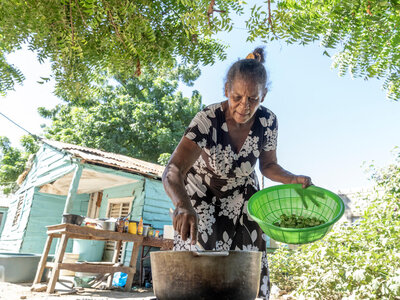Dominican Republic
- 22.8%
- of people live in poverty
- 28%
- of children under 5 suffer from anaemia
- 11 million
- population
The Dominican Republic is an upper-middle-income country, ranking 82 out of 193 countries in the 2023-24 Human Development Index.
Over the past decade, the country has experienced sustained economic growth and stability – but inequalities persist. Poverty affects nearly a quarter of the population and extreme poverty affects almost 3 percent. Most low-income families live in urban areas, with 63 percent headed by women.
Inequalities drive food insecurity, with restricted purchasing power among vulnerable groups, limited coverage of basic services and safety nets, inadequate regulation of markets and recurrent shocks. Additionally, undernutrition and overweight/obesity – known as the double burden of malnutrition – cost the country 2.6 percent of its GDP.
The Dominican Republic is one of the countries most vulnerable to the effects of climate change. Floods, droughts and other disasters cost lives, livelihoods and government finances, and seriously threaten sustainable development. Women and girls are particularly vulnerable due to gender inequalities.
Food insecurity affects an estimated 14 percent of the population and is concentrated in poorer and more vulnerable parts of the country, including rural and disaster-prone areas, and among vulnerable groups such as woman-headed households. In addition, insufficient economic access to nutritious foods and diverse diets, especially among boys, girls, adolescents and women, contributes to anaemia, overweight and obesity. One out of three households lacks access to a nutritious diet.
The World Food Programme has been in the Dominican Republic since 1969. We support the country’s efforts to achieve zero hunger by providing food assistance, tackling malnutrition and strengthening capacity. We also focus on crisis response and preparedness.
What the World Food Programme is doing in the Dominican Republic
-
Crisis support
-
We provide humanitarian assistance to food-insecure populations before, during and immediately after crises so that people can meet their food and other essential needs. This include cash-based transfers, food and non-food items. WFP also raises people’s awareness of food security and nutrition. Priority is given to pregnant/breastfeeding women and children under 5, with a focus on complementing local social-protection systems.
-
Malnutrition
-
Sustainable food systems
-
Capacity strengthening
-
Logistics
Dominican Republic news releases
Go to pagePartners and Donors
Find out more about the state of food security in Dominican Republic
Visit the food security analysis pageContacts
Office
Avenida Anacaona No.9, Mirador Sur, Casa de las Naciones Unidas
Santo Domingo
Dominican Republic






